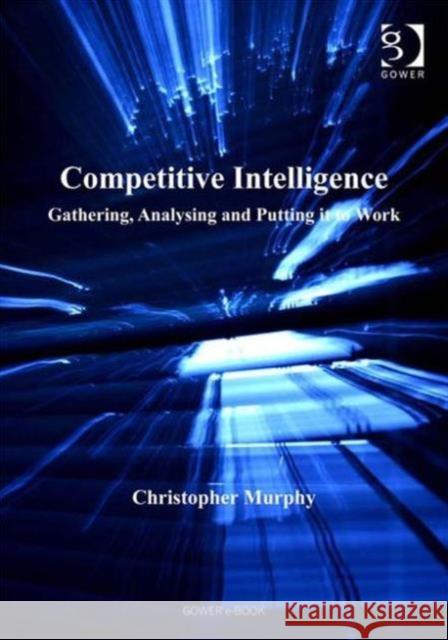Competitive Intelligence: Gathering, Analysing and Putting It to Work » książka
Competitive Intelligence: Gathering, Analysing and Putting It to Work
ISBN-13: 9780566085376 / Angielski / Twarda / 2005 / 304 str.
Competitive Intelligence: Gathering, Analysing and Putting It to Work
ISBN-13: 9780566085376 / Angielski / Twarda / 2005 / 304 str.
(netto: 720,05 VAT: 5%)
Najniższa cena z 30 dni: 654,86
ok. 16-18 dni roboczych.
Darmowa dostawa!
Every business manager needs intelligence to find suppliers, mobilize capital, win customers and fend off rivals. Obtaining this is often an unplanned, instinctive process. The manager who has a conscious, systematic approach to acquiring intelligence will be better placed to recognize and seize opportunities whilst safeguarding the organization against the competitive risks that endanger its prosperity a and sometimes even its survival. Christopher Murphy's Competitive Intelligence explains: a cents the theory of business competition a cents how companies try to get ahead of their rivals a cents methods of research and sources of information that generate the raw material for creating intelligence a cents analytical techniques which transform the mass of facts and opinions thus retrieved into a platform of sound, useable knowledge to support informed business decision making. The text includes plenty of examples and experiences from the author's own consulting experience. He draws on a wide variety of disciplines, including literary criticism (or how to read between the lines of company reports, announcements and media stories) and anthropology (understanding corporate culture), as well as the more obvious ones such as financial analysis, management theory and business forecasting techniques. This fusion of insights from many fields of expertise provides a very readable, practical and imaginative framework for anyone seeking to gather and make effective use of market and company data. While focused on the British business environment, the lessons drawn are of universal application, and examples are taken from across the globe. In addition a chapter is devoted to researching industries and companies in other countries. Although primarily concerned with commercial enterprises, many of the principles and techniques will also be of considerable practical relevance to managers in the public sector or not-for-profit organizations. Competitive Intelligence also provides a legal and ethical framework to guide the unwary and to curb the over-enthusiastic. The final chapter, Intelligence Countersteps, will open your eyes to the need to protect your own organization from some of the practices of less scrupulous researchers and investigators."











